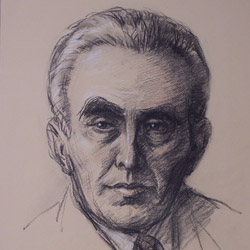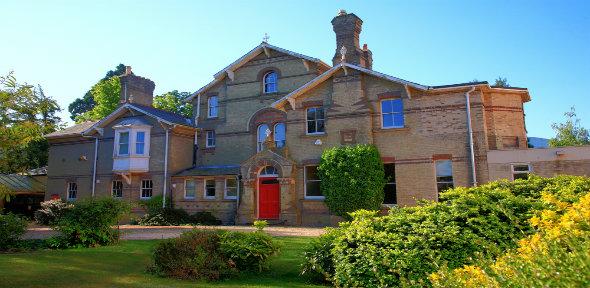Our History
The Institute of Criminology has a worldwide reputation for excellence in both research and teaching. Founded by Sir Leon Radzinowicz in 1959, it was one of the first criminology institutes in the UK and has exerted a strong influence on the development of the discipline. The tradition of competence and leadership continues to the present. The Institute's core academic staff are all leading researchers in their fields. Additional distinguished academic and research staff complement and enhance the academic community, and Visiting Fellows and Scholars from around the world often contribute to the teaching programmes.
The academic staff come from multidisciplinary international backgrounds and have clear empirical and theoretical orientations. Their interests cover a broad range of topics: e.g. delinquent development, social contexts and crime, policing, criminal justice, penal theory, sentencing, community sanctions, race and gender issues in criminal justice, prisons, comparative penology, human trafficking and smuggling, the impact of imprisonment on families, violence, forensic mental health, and criminological theories for instance.
The Institute is home to six thriving Research Centres: the Jerry Lee Centre for Experimental Criminology, the Centre for Analytical Criminology (Peterborough adolescent & Young Adult Study), the Centre for Penal Theory and Ethics, the Prisons Research Centre, the Centre for Community, Gender and Social Justice, and the Violence Research Centre. In recognition of their outstanding research, Cambridge criminologists have been awarded numerous prestigious international awards.
Founding
The Cambridge University Institute of Criminology was founded in 1959 by Sir Leon Radzinowicz, with the support of a donation from the Wolfson Foundation and the Howard League for Penal Reform. It has since flourished providing a range of different courses including two full-time Masters courses in Criminology for the M.Phil. degree (a 9 month course and a 12 month course; two part-time Masters courses for senior practitioners working in criminal justice systems or allied agencies (a two year part-time course with residential components, leading to the Master of Studies degree in Applied Criminology, Policing and Management (Police Executive Programme)and the Applied Criminology, Penology and Management (Cambridge Penology Programme). The Institute also runs a thriving Ph.D programme for full-time and part-time study.
Sir Leon Radzinowicz

Sir Leon Radzinowicz first came to the University of Cambridge in 1938 to work on the English Justice and penal system. He first established the Department of Criminal Science within the Faculty of Law during wartime Britain. Following huge success across the UK in changing perceptions on criminology he was given a fellowship at Trinity College and began to discuss the possibility of a separate department entirely to criminology. He was the first Director of the Institute, holding the position from 1959 to 1972. He also become the first Wolfson Professor of Criminology; a senior professorship within the Institute and created the Wolfson Foundation. He was knighted in 1970, just before his retirement from the Wolfson Chair in 1973. Professor Nigel Walker followed as both Director and Wolfson Chair, and then Professor Sir Anthony Bottoms (1984). For a while the positions of Director and Wolfson Chair were separated, with Professor Michael Tonry taking up the Directorship (1999), succeeded by Professor Friedrich Lösel as Director (2005). Professor Lawrence Sherman became the Wolfson Professor of Criminology in 2007, succeeding Professor Bottoms, and Director of the Institute of Criminology in 2012 (until 2017). Professor Loraine Gelsthorpe became the Director of the Institute in October 2017 (the first woman) and Professor Manuel Eisner became the Wolfson Professor of Criminology at the same time.
The Institute’s Radzinowicz Library of Criminology was named after Sir Leon Radzinowicz and the library holds the world’s largest collection of criminology material, holding around 60,000 books and maintaining stock increases of roughly 1000 a year.
Staff and Students
While the Institute is part of the Faculty of Law, it functions as a separate department; its staff are recruited from a wide array of disciplines including psychology, sociology, history and philosophy, law. There are about 65 members of staff (academic, research and administrative staff).
The Institute has approximately 50 PhD students, 30-40 full time M.Phil students, and 200 M.St students. The institute also offers courses to undergraduates, particularly in Law, but also in Human Social and Political Sciences and in Psychology and Behavioural Sciences.
Seminars
The Institute runs a regular series of public Seminars given by guest speakers, open to all staff and students and local/regional practitioners. The seminars are on Thursdays at 5.30pm. Please contact events@crim.cam.ac.uk if you would like to be added to our mailing list.
Wolfson Foundation and Institute Buildings
The Wolfson Foundation stated that its foundation grant for the Institute ‘was made on the understanding that suitable and permanent accommodation would be provided by the University’ (Wolfson Foundation 1960, pp.16-17). The University, however, was initially unable to meet this requirement. Two interim steps were taken: First, the Institute was granted use of some existing University premises, initially from 1959-62 at 4 Scroope Terrace and then from Easter 1962 at 7 West Road, part of the University's then developing Sidgwick Site, where a number of departments in the arts, humanities and social sciences were being housed. The building on West Road was explicitly assigned to the Institute as 'temporary premises', but this temporary occupation lasted over 40 years.
The new Institute is on eastern edge of the Sidgwick Site. Sidgwick Site was named after the philosopher Henry Sidgwick, who studied at Cambridge in the 19th century.

